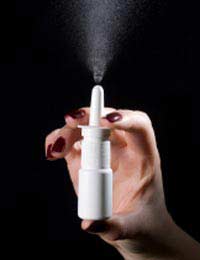Addiction to OTC Nasal Sprays

While the word ‘addiction’ has different meanings to many of us, its use for nasal sprays refers more to the rebound effect of regular medication use. In turn, the person feels compelled to keep using the product to obtain the same relief. Making matters worse is that more of the product must be used for the same effect.
This is the nature of over-the-counter (OTC) nasal sprays and the use of the term ‘addiction’ needs to be understood in this context. Clearly, it is not the same as many classic addictions such as alcohol or illegal drug addiction.
What Happens When Using Nasal Sprays?
When you use an OTC nasal spray, after several days of use you might begin to find your nose does not respond to the medication as well as it did when you started the drug therapy. The result is that you feel compelled to use more of the medication to control your congestion.To compound matters, the congestion can actually worsen if you stop using the medication. It is not classical addiction in this sense but rather, what we call a medication rebound effect.
A person does not experience the classical addiction signs such as a compulsive craving for the medication. They do, however, still feel they must use it to prevent the rebound effect and obtain that same relief from their congestion.
The Science of Nasal Sprays
When you spray your nose, the very small blood vessels in your mucuous membranes begin to constrict. The result is a feeling of relief but after chemicals such as phenylephrine start to wear off, you feel the congestion again.The more and more you use the chemicals, the worse your original symptoms can become. It’s a vicious cycle that has led to OTC nasal sprays being coined as ‘addictive’ for those who use them.
Frequent Use of OTC Nasal Sprays
Some people aren’t just using these sprays to combat symptoms from a common ailment such as a cold or flu. Instead, they may suffer chronic congestion for other reasons, leading to a need for a regular medication.OTC nasal sprays are not meant for long-term use, but the fact that some people do use them regularly is a problem in itself. These people are more likely to experience the rebound effect of OTC nasal sprays along with an eventual worsening of their congestion.
What Can You Do?
Most doctors will recommend that you do not use an OTC nasal spray for more than a few consecutive days. Prescription nasal sprays may contain steroids and should be followed only according to the directions of your doctor and pharmacist.Alternative Treatments for Congestion
It is also worth trying some natural remedies under your doctor’s advice, as they do not contain the chemicals within OTC nasal sprays. Keep in mind though that natural is not equal to safe, which means caution and good sense should always still apply. Check the ingredient list and still use the minimum you need for relief.Even though we think of medications as safe, they still come with unexpected consequences. If you need to use an OTC nasal spray, use it carefully and see your doctor if you are concerned you are suffering from the rebound effect. With the right approach, you can get relief from congestion without the ‘addictive’ qualities that a medicine can bring with it.
- What is Work Addiction?
- The New Addiction: Romantic Rejection
- Gambling and Society
- Addiction to Shopping
- Dealing With An Addiction To Self-Harm
- Sugar Addiction
- Beating an Addiction to Sex
- Stopping Eating Disorders
- Beating an Addiction to Food
- Beating An Addiction To Gambling
- What is Codependency?
- Beating an Addiction to Drugs
- Beating an Addiction to Pornography
- Beating an Addiction to Chocolate
- Beating an Addiction to Illegal Drugs
- What is a Casual Addiction?
- Beating an Addiction to Computers
- Beating an Addiction to Exercise
- Beating an Addiction to Caffeine


Re: Addiction to Shopping
Hi, I came to realize that I have shopping addiction and it’s getting out of control. I need help but I don’t know where to start. I would…
Re: Beating an Addiction to Pornography
I am in a long term relationship and have a fulfilling sexlife, but i struggle with porn, i feel the need and temptation…
Re: Offering Support to an Addiction Sufferer
My big sister died of a brain tumor then 6 week later my mum went too . I have multiple myeloma and am terminal.…
Re: Addiction to Shopping
I am now at my whits end, my husband is spending money like it has gone out of fashion, and now i am homeworking, I take in the deliveries…
Re: How to Assess The Level of an Addiction
Over a series of many years I have discovered that I have an addicted personality, it has never worried me too much…
Re: How to Assess The Level of an Addiction
Over a series of many years I have discovered that I have an addicted personality, it has never worried me too much…
Re: Offering Support to an Addiction Sufferer
I am an addict and I have just separated from my husband of 16 years as we together developed a cocaine problem.…
Re: Recognising Alcohol Addiciton
Ever since I can remember, I've always overindulged before/during social events. It's got to the point where I've been hateful to…
Re: Beating an Addiction to Chocolate
I suffer from anxiety and mild depression. As a stay at home mum I find myself bored sometimes and truthfully stressed. My…
Re: Offering Support to an Addiction Sufferer
Hi im dpeaking on behalf of my partner , who has a bad alcohol addiction..And this has been going on for neaely…